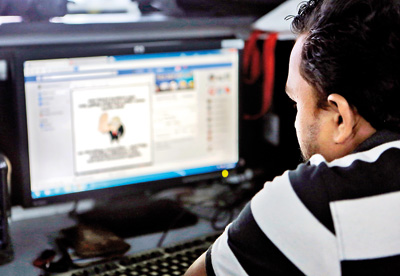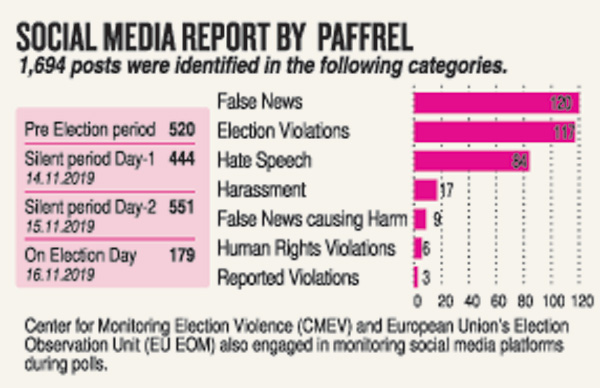News
Facebook holds its own law above national laws as critics slam inaction
In spite of the 48-hour ban on electioneering activity before polls opened yesterday, thousands of partisan political posts coupled with paid political advertisements were being shared by hundreds on social media, election watchdogs said.

Facebook should be more active in tackling hate speech and misinformation during the silent period, say local poll monitors
“As of now, we have recorded 556 complaints related to Facebook in addition to 112 active paid political advertisements in posts. Some of the reported contents were removed by Facebook management once we took it up through the Election Commission but this situation is far from satisfactory,” Rohana Hettiarachchie, Executive Director of the People’s Action for Free and Fair Elections (PAFFREL), said late on Friday.
In the run-up to the election, two PAFFREL teams monitored a real-time “dashboard” that showed the most trending posts from more than 11,000 Facebook pages and groups. The data came from Sinhala, Tamil and English pages run by political parties or on behalf of presidential candidates, gossip pages, meme pages, key influencers etc. Facebook has nearly 6 million active users in Sri Lanka.
“Once our technical teams identified pages with content that spread hate speech, misinformation, or violated election laws, our legal officers scrutinised the material before sending it to the Election Commission for the commission to take it up with Facebook management,” Mr. Hettiarachchie said.
“The action taken by Facebook on the reported posts was very low when looking at the number of hate speech posts that were removed. This is because Facebook bases its considerations on its ‘Community Standards’, not the local law.”
Mr. Hettiarachchie said it was imperative that Facebook be more active in tackling hate speech and misinformation campaigns and removing political advertisement during the silent period.
The Centre For Monitoring Election Violence (CMEV) noted there was very active and well-targeted campaigning on Facebook through posts and political advertisements and by social media influencers.
“Even after the silent period became effective we noticed that a significant amount of posts and political ads were still on Facebook and bein shared. We brought this to the attention of the Election Commission but are yet to see any results,” Manjula Gajanayake, CMEV’s National Coordinator, said.
The European Union’s Election Observation Mission (EU EOM), which includes a five-member team in Sri Lanka dedicated to monitoring social media, also said it experienced difficulties over getting content removed from Facebook despite setting up a special mechanism with Facebook management to target misinformation and hate speech.
Election Commission officials said Facebook acted quickly in maintaining its Community Standards over hate speech but not over misinformation campaigns reported to it.
The officials said they have been receiving hundreds of complaints. Most were only screenshots of posts. They urged people to include the links to such posts in order to quickly track them down and prevent them from being widely shared.
Days ago, a Facebook post showing a youth burning his father’s polling card in protest at his political leanings went viral while postal voting was in progress. Before the Election Commission could track the original uploader, thousands of Facebook users shared the post online, commenting about it on public and private groups.
“Even my photograph is being used for misinformation campaigns,” National Election Commission Chairman Mahinda Deshapriya complained to the Sunday Times. “We have asked Facebook to take down these campaign posters but their management is acting very slowly. It is a very sad situation.”
He expressed grave concerns about what he called Facebook’s failure to cooperate with authorities on hate speech and misinformation during a closely contested poll.
A senior official attached to the Election Commission’s Social Media Monitoring Unit spoke bluntly under condition of anonymity: “What Facebook wants is our money here. It just doesn’t care about the platform’s potential negative impact on elections or its role in influencing voters.
We spent many hours in discussions over tea but achieved nothing satisfactory.”
Facebook, the world’s richest social media site, has come under severe criticism after credible evidence emerged about the influencing role it played during the 2016 presidential election in the United States and the Brexit referendum in Britain.
| Social media giant insists it’s a ‘force for democracy’ | |
| Amidst criticism over its role in influencing Sri Lankan voters in the presidential polls, Facebook said it had adopted a “multi-faceted approach” to show it is a “valuable force for democracy”. This approach “includes removing fake accounts, preventing the spread of misinformation, disrupting coordinated inauthentic behavior, increasing ads transparency and promoting civic engagement in order to ensure the integrity of the Sri Lankan elections,” the social media giant said. “We believe Facebook can be a valuable force for democracy around the world, encouraging healthy debate, providing voters more direct access to their candidates and giving more people a voice in the political process. “That’s why we’re focused on ensuring the integrity of elections on Facebook, and we’ve learned a lot from our work around the world over the past few years,” a Facebook company spokesperson told the Sunday Times. On removal of questionable content, Facebook said, “We remove all content that violates our Community Standards whenever we become aware of them. We treat every report about content on our platform in the same way around the world. It doesn’t matter who or where the report comes from; if the content violates our Community Standards, we will remove it, no matter who posted it, and whether it was reported once or a thousand times.” It says it follows a clear process everywhere in the world. “When something on Facebook or Instagram is reported to us as violating local law but doesn’t go against our Community Standards we may restrict the content’s availability in the country where it is alleged to be illegal.” Facebook added it had worked with the Election Commission as well as political parties and candidates to inform them about its Community Standards, and how to report content that they believe violates both its Community Standards and local laws, including regulations around blackout periods. Promoting its democratic credentials, Facebook said, “We supported the My First Vote organisation as it launched its campaign to encourage new voters to participate in this year’s presidential elections. On election day, we will remind all eligible Sri Lankan voters to cast their votes and provide more information about polling places.” |

